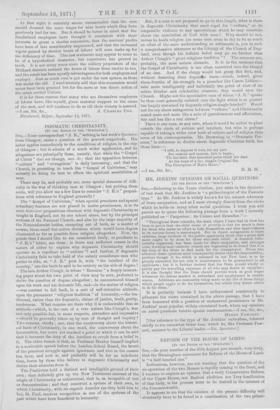DOGMATIC CHRISTIANITY.
(To zas EDITOR OF THE "SPICOTAT011.1 Satt,—Your correspondent "J. R.," writing in last week's Spectator from Glasgow, raises a question of the gravest magnitude. His letter applies immediately to the conditions of religion in the city of Glasgow ; but it admits of a much wider application, and its allegations are principally these, namely, that while the " Gospel of Christ" does not change, men do ; that the opposition between " culture " and "evangelism" is daily increasing ; and that the Church, in persisting to teach the "Gospel of Calvinism," may actually be doing its best to efface the spiritual sensibilities of men.
There may be, and probably are, some special elements of diffi- culty in the way of thinking men at Glasgow ; but putting these aside, will you allow me a few lines to consider "J. R.'s " proposi- tions with reference to England generally ?
The "gospel of Calvinism," when special preachers and special subsidiary features are not placed in undue prominence, is in its main historical propositions identical with dogmatic Christianity as
taught in England, not by one school alone, but by the principal sections of the National Church, and also by the large majority of the Nonconformist bodies, excepting out of both, as a matter of course, those small but active divisions which would have dogma eliminated as far as possible from religion altogether. Now, the points that I should like to see considered fairly, as pendants to "J. R.'s " letter, are these : is there any sufficient reason in the nature of either to explain why dogmatio Christianity should operate as a repellent to " culture "? and further, if dogmatic Christianity fails to take hold of the calmly considerate men who prefer to side, as " J. R." puts it, with "the intellect of the country," can the fault be said to be entirely on the side of dogma ?
The late Arthur Clough, in whose " Remains " a deeply interest- ing paper about his own point of view may be seen, preferred to shelve the question of dogma altogether ; he concentrated himself upon his work and his domestic life, and—in the matter of religion —was content to fall back, in a sort of self-retentive attitude, upon the permanent "religious tradition" of humanity,—the tra- ditional, rather than the dogmatic, claims of justice, truth, purity, tenderness. What reasons are there why it is undesirable that an attitude—which, in the case of a rare nature like Clough's, was not only possible but, in some respects, attractive and impressive —should be generally taken up by mon of thought and inquiry ? Two reasons, chiefly ; one, that the controversy about the histori- cal basis of Christianity, in one word, the controversy about the Incarnation, has never yet reached a point at which it can be said that it becomes the duty of the intellect to revolt from a belief in it. The other reason is that, as Professor Huxley himself implied in a noticeable speech before the London School Board, the brunt of the practical struggle against ignorance and vice in the masses has been, and now is, and probably will be for an indefinite time, borne by those who believe in dogmatic Christianity and derive their stimulus from it.
The Positivists hold a distinct and intelligible ground of their own ; they definitely give up the New Testament account of the origin of Christianity as unhistorical, that is, as incapable of test or demonstration ; and they construct a system of their own, in which Christianity, with its organic founder (as they hold hiva to be), St. Paul, receives recognition as one of the systems of the past which have been beneficial to humanity. But, if a man is not prepared to go to this length, what is there in dogmatic Christianity that need repel his "culture," or do irreparable violence to any speculations which he may entertain
about the correlation of God with luau Why- should he not,
unless he holds religion (as some men seem to do) to be as much an affair of the mere understanding as arithmetic is, join in such a comprehensive utterance as the Liturgy of the Church of Eng- land, even though his definite belief may go no further than Arthur Clough's "great religious tradition "? The sermons are, probably, the most serious obstacle. It is in the sermons that the Gospel of Christianity is too often converted into the Gospel of an -ism. And if the clergy would but grasp this fact, and, without deserting their dog:nate basis—which, indeed, gives three-fourths of his strength to a preacher like Canon Liddon- take more intelligently and habitually the point of view of an active thinker and seholarlike observer, they would save the Church. Might not the speculative inen of whom "J. R." speaks be then more generally enlisted into the fight which is at present too largely sustained by dogmatic religion single-handed ? Would not the cry about antagonism between "culture " :tad Christianity sound more and more like a note of querulousness and affectation, less and less like a real alarm ?
There is one man, at any rate, whom it would be unfair to place
outside the circle of culture and intellect, but who is perhaps capable of taking a wider view both of culture and of religion than some of his contemporaries. Mr. Browning, in " Dramatis Per-
sonae," in reference to doubts about dogmatic Christian faith, has these lines :—
" I still, to suppose it true, for my part
Soo reasons and reasons, this to begin; 'Tis the faith that launched point-blank her dart At the head of a lie; taught Original Sin The Corruption of Man's Heart."






























 Previous page
Previous page